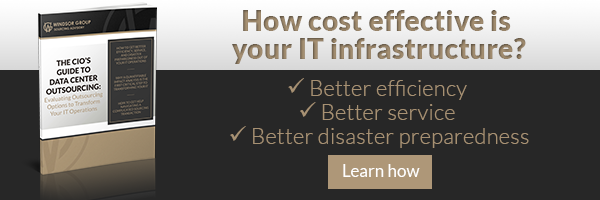 Mergers and acquisitions are planned to generate increased benefits for the newly-formed enterprise. If one or both parties are actively engaged in infrastructure outsourcing – or in the midst of transitioning into an outsourcing contract – that can have a significant impact on how a merger, acquisition or divestiture plays out. Infrastructure outsourcing agreements that are already in place can streamline your transition as well as your functionality going forward.
Mergers and acquisitions are planned to generate increased benefits for the newly-formed enterprise. If one or both parties are actively engaged in infrastructure outsourcing – or in the midst of transitioning into an outsourcing contract – that can have a significant impact on how a merger, acquisition or divestiture plays out. Infrastructure outsourcing agreements that are already in place can streamline your transition as well as your functionality going forward.
Mergers and acquisitions offer plenty of challenges in terms of integrating technologies and processes. You have to consider regulatory compliance and governance policies, and you may even have to reconcile differing approaches to outsourcing opportunities. What infrastructure or services become redundant, and what new ones will be needed? How will they be deployed?
Vendors have concerns, too, because service providers can be significantly affected by mergers and acquisitions that involve one of their clients. Will the new company want or expect the same services? What if both entities being merged have different outsourcing partners? What if the provider’s client is being acquired by another company? Will they transfer services to another vendor or pull them in-house?
Getting your vendor involved early on will streamline your M&A process.
An independent sourcing consultant can smooth the way.
Assessing what exists within each entity and determining what the newly-integrated architecture and functions should look like requires intricate evaluation. It’s time-consuming and, done wrong, could damage your new enterprise’s ability to successfully manage operations during the transition or beyond. The new plan has to provide superior capabilities, just like the merger or acquisition itself.
You may want to ask your infrastructure outsourcing provider to handle migration, consolidation and business process integration while you focus on other aspects of your business change. But in the meantime, there are critical questions to answer:
- Should you simply adopt one company’s solution for the whole? Mix and match? Start over from scratch to design an entirely new solution?
- Who will provide which services during the transition? If you’re divesting a division, will they be eligible to continue receiving services for some period of time?
- What about your current licensing agreements?
You’ll also need to consider the financial implications of your merger or acquisition on current outsourcing agreements. If your new entity will require additional services, will that increase be enough to negotiate lower pricing? Conversely, will consolidation result in a reduced need for some services, making you unable to meet contractual minimums?
An independent consultant with in-depth knowledge of business management and your industry as well as IT integration and the current marketplace can help you explore the most productive options. They understand your legacy systems, your personnel issues and the latest IT trends, issues and best practices you should incorporate into your transformation. An infrastructure outsourcing consultant with hands-experience M&A experience understands what you’re going through and can help minimize risks or other negative impacts.
They can work with your current supplier(s), to identify services and costs that will affect or be affected by your business change. And they can help renegotiate contracts or negotiate new ones that will serve your new enterprise more than adequately, positioning your new company for maximum agility and competitiveness.
With their guidance, you can develop a solution that works – for everyone, including current service providers. Your merger or acquisition process will not only be more streamlined, you’ll get better results.
You can’t necessarily predict today whether a merger or acquisition is in your future. Instead of facing these complex challenges with a blank slate should the situation arise, you can plan ahead to make the transition less traumatic, with least impact on daily operations, by building flexibility into your infrastructure outsourcing contract.
photo credit: Kevin Krejci via photopin cc


